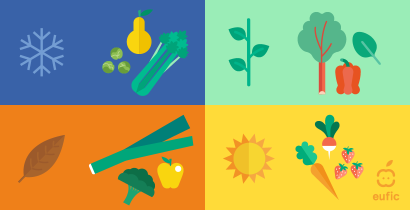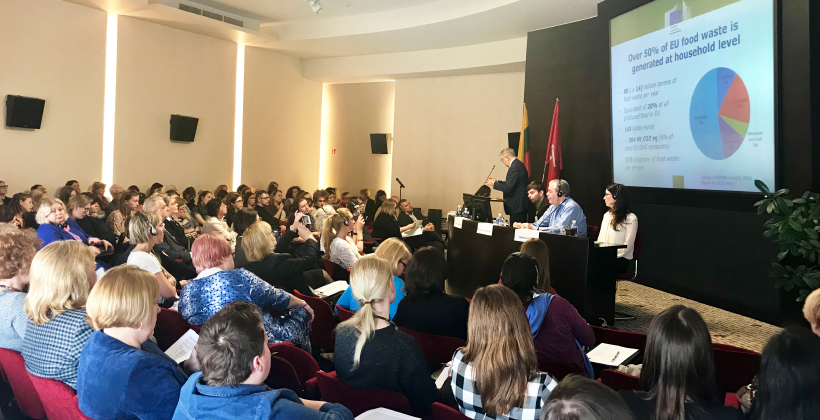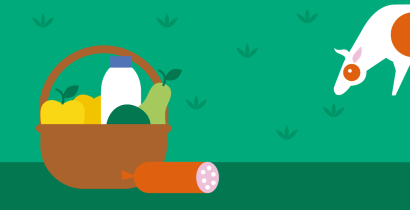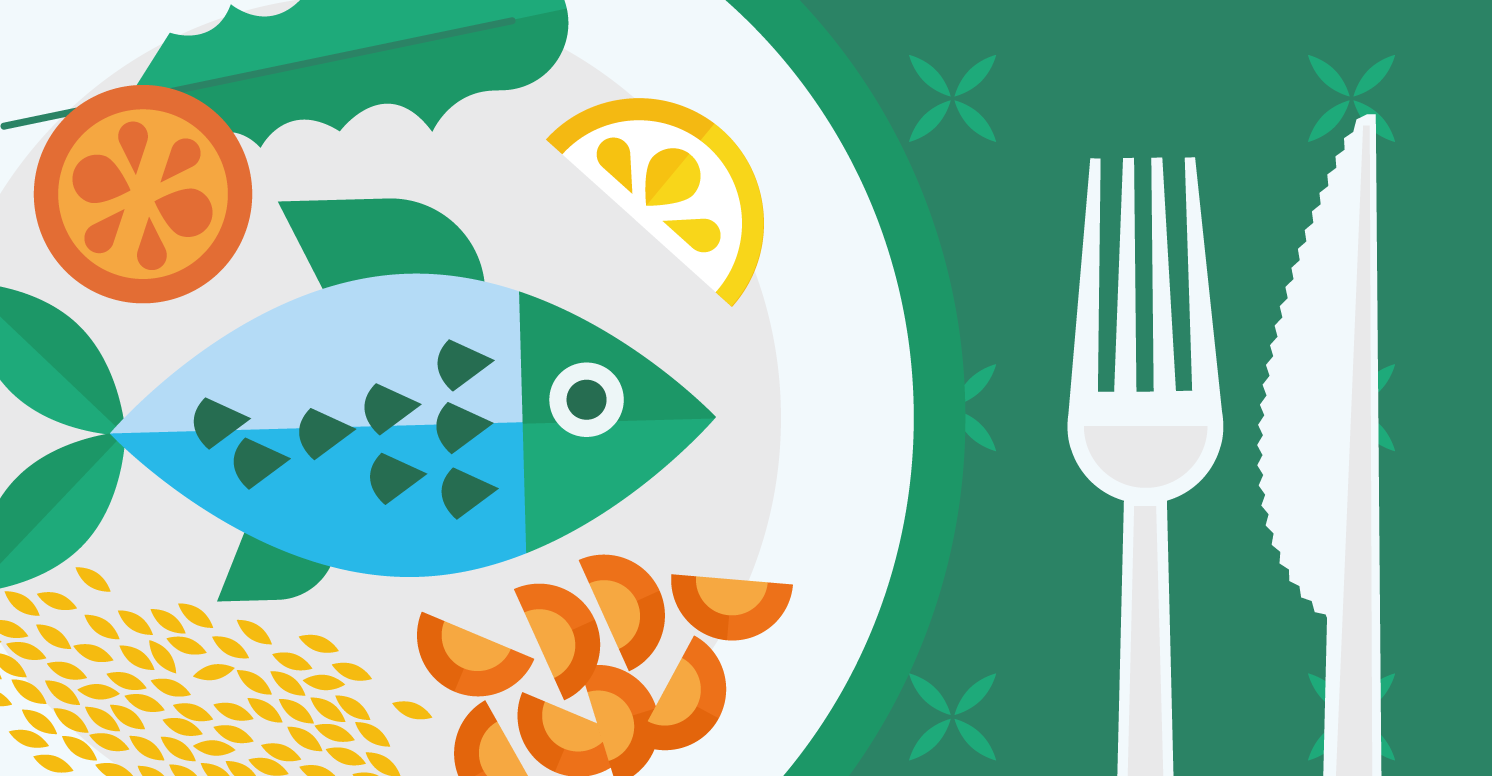Towards more sustainable diets
Last Updated : 19 April 2018Over 9 billion people are foreseen on Earth by 2050. With an increasing population comes a growing demand for food.1 In addition, many of us, especially in wealthy regions, consume more food than we need, and our diets are rich in animal-based products, a combination that has major negative impacts on the environment.2,3 To be able to provide enough food for future generations, while minimising our environmental impact, we must switch to more sustainable food production and change our dietary patterns.1
The United Nations Food and Agriculture Organization (FAO) defines sustainable diets as having a low environmental impact, while meeting current nutritional guidelines, all while remaining affordable, accessible and culturally acceptable.4 But what changes do we need to make to achieve this vision?
The environmental impact of food production
The current food production system is recognised as one of the main causes of environmental damage, including climate change and the loss of natural resources.5 Agriculture alone is responsible for up to 30% of man-made greenhouse gas emissions (GHGEs), and 70% of our water use.3,6 It is the leading cause of deforestation, land use change, biodiversity loss, and a major source of water pollution and freshwater consumption.6 Other activities involved in food production and consumption, including raising livestock, transport, packaging and food waste are also responsible for the environmental impact. Achieving a sustainable food production system and reducing food losses and waste are important global challenges that can help tackle the increased demand for food and help us to sustainably produce enough nutritious food for all.
The three pillars of a sustainable diet
Which steps to take as individuals wishing to achieve a healthy and sustainable diet might seem confusing at first. Despite the complexity, there are three changes that we can all make to achieve a more sustainable diet: consume less, waste less, and reduce our consumption of animal products in favour of plant-based alternatives.
Consume less
There is a global trend towards overconsumption, despite many around the world remaining hungry. While overconsumption has historically been a problem of developed countries, it is now a major issue in the developing world, particularly in emerging economies like China and Brazil. Overconsumption contributes to an increase of overweight and obesity, while at the same time driving unnecessary demand for increased production of crop and livestock with the associated environmental impact.7 Lowering our overall energy intake, especially in high-consuming countries, can benefit the health of both the environment and the population.
Waste less
In Europe, an estimated 88 million tonnes of food is discarded every year. Food is wasted during all stages of the food chain, by producers, processors, retailers, and caterers. However, most food waste, about 53% in Europe, takes place at home.8 Producing food that is then thrown away represents an unnecessary waste of land, water, labour and energy, and futile contribution to GHGEs. If food waste was a country, it would be the third largest producer of CO2, trailing only the USA and China!9
Less animal-based, more plant-based
In general, producing animal-based foods is more resource-intensive than plant-based foods, and has a higher environmental impact (such as land use, fresh water consumption and CO2 emissions per tonne of protein consumed).7 Animal-based products also differ in their environmental impact. For instance, 7 times more CO2 is produced to make 1 kg of beef compared to the same quantity of chicken.10 Insects, a common food source outside Europe, are also emerging as a protein source, with the potential to produce less GHGEs, and use less resources than conventional animal agriculture for similar amounts of protein.11 Choosing more sustainable animal-based products such as poultry, sustainably-grown fish or insects, reducing the consumption of animal-based products such as meat, dairy and eggs in general, and incorporating more plant-based products, such as fruits, vegetables, grains and legumes, are great steps towards a more sustainable diet.7 Diets high in plant-based foods have also been linked to a decreased risk of hypertension, stroke, type 2 diabetes, and certain cancers.12
For those of us that choose to eliminate animal products from our diets entirely, a vegetarian or vegan diet can provide enough protein if the sources are diverse. A diversity of sources is important because some nutrients, including protein and essential amino acids, are found in smaller quantities in plant-based foods when compared to meat or fish. Therefore, what one source lacks can be compensated by another.12 The EU-funded project Protein2Food is working towards creating innovative plant-based products with enhanced protein content and quality. In the future, these products could represent an attractive option of protein-rich food for people who are willing to incorporate more plant-based food to achieve a more sustainable but equally nutritionally balanced diet.
Sustainable diets: not an easy concept
Achieving a sustainable diet may require trade-offs. For instance, buying locally-grown food may seem a sustainable choice, but only when the products are in season where we live. This is because the energy consumed to grow fruits and vegetables in heated greenhouses in winter is much higher than that needed to transport them from warmer countries.13
Similarly, environmental and health benefits may sometimes not go hand in hand. For example, the benefits of fish consumption, particularly due to their omega-3 content, are well documented. However, overfishing and depletion of some fish stocks is already a problem, and if we all increased our fish consumption in line with dietary guidelines, the situation could get even worse. Research is being done into the development of oilseeds containing higher levels of omega-3’s, and omega-3 enriched chicken is already a reality in supermarkets. These innovative products could help us meet our nutritional needs without putting pressure on our oceans. In the meantime, choosing to consume fish that is labelled as ‘sustainably sourced’ is a choice we can all make.13
Small steps to achieve big goals
Whatever the sustainable diet approach followed, changes need to be realistic. Even small changes, on a global scale, can have a huge effect in reducing the environmental impact of food consumption. For instance, following a vegetarian or flexitarian diet (i.e. deliberate reduction of animal products consumption by substitution with plant-based alternatives), substituting ruminant meat (e.g. beef) with pork, poultry, or insects that have a lower ecological footprint, and choosing sustainably sourced fish and seafood, are small steps that nonetheless can produce huge effects on the global environmental impact of our diets.3,14
For more practical tips on how to eat more sustainably, click here.
References
- Godfray, H. C. J. et al. Food security: the challenge of feeding 9 billion people. Science 327, 812–8 (2010).
- Alexandratos, N. & Bruinsma, J. The 2012 Revision World agriculture towards 2030/2050: the 2012 revision. (2012).
- Aleksandrowicz, L., Green, R., Joy, E. J. M., Smith, P. & Haines, A. The Impacts of Dietary Change on Greenhouse Gas Emissions, Land Use, Water Use, and Health: A Systematic Review. PLoS One 11, e0165797 (2016).
- Burlingame, B. Sustainable diets and biodiversity. Directions and solutions for policy, research and action. IOM Sustainable Diets (2012).
- Vermeulen, S. J., Campbell, B. M. & Ingram, J. S. I. Climate Change and Food Systems. Annu. Rev. Environ. Resour. 37, 195–222 (2012).
- Whitmee, S. et al. Safeguarding human health in the Anthropocene epoch: report of The Rockefeller Foundation–Lancet Commission on planetary health. Lancet 386, 1973–2028 (2015).
- Ranganathan, J. & Vennard, D. Shifting Diets for a Sustainable Food Future. Working Papers (2016).
- Stenmark, A., Jensen, C., Quested, T. & Moates, G. Estimates of European food waste levels. Fusions (2016).
- Food and Agriculture Organization. Food wastage footprint & Climate Change. (2015).
- Carlsson-Kanyama, A. & González, A. D. Potential contributions of food consumption patterns to climate change. Am. J. Clin. Nutr. 89, 1704S–1709S (2009).
- Smetana, S., Palanisamy, M., Mathys, A. & Heinz, V. Sustainability of insect use for feed and food: Life Cycle Assessment perspective. J. Clean. Prod. 137, 741–751 (2016).
- Craig, W. J. Nutrition Concerns and Health Effects of Vegetarian Diets. Nutr. Clin. Pract. 25, 613–620 (2010).
- Garnett, T. What is a sustainable healthy diet? (2014).
- de Bakker, E. & Dagevos, H. Reducing Meat Consumption in Today’s Consumer Society: Questioning the Citizen-Consumer Gap. J. Agric. Environ. Ethics 25, 877–894 (2012).



